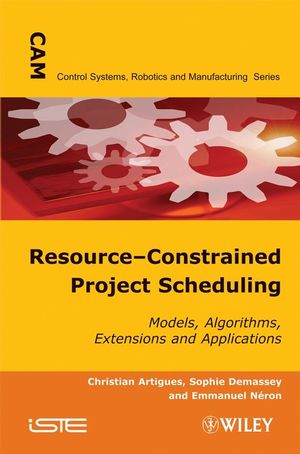Resource-Constrained Project Scheduling: Models, Algorithms, Extensions and ApplicationsISBN: 978-1-84821-034-9
Hardcover
288 pages
April 2008, Wiley-ISTE
 |
||||||
This title presents a large variety of models and algorithms
dedicated to the resource-constrained project scheduling problem
(RCPSP), which aims at scheduling at minimal duration a set of
activities subject to precedence constraints and limited resource
availabilities.
In the first part, the standard variant of RCPSP is presented and analyzed as a combinatorial optimization problem. Constraint programming and integer linear programming formulations are given. Relaxations based on these formulations and also on related scheduling problems are presented. Exact methods and heuristics are surveyed. Computational experiments, aiming at providing an empirical insight on the difficulty of the problem, are provided.
The second part of the book focuses on several other variants of the RCPSP and on their solution methods. Each variant takes account of real-life characteristics which are not considered in the standard version, such as possible interruptions of activities, production and consumption of resources, cost-based approaches and uncertainty considerations.
The last part presents industrial case studies where the RCPSP plays a central part. Applications are presented in various domains such as assembly shop and rolling ingots production scheduling, project management in information technology companies and instruction scheduling for VLIW processor architectures.
In the first part, the standard variant of RCPSP is presented and analyzed as a combinatorial optimization problem. Constraint programming and integer linear programming formulations are given. Relaxations based on these formulations and also on related scheduling problems are presented. Exact methods and heuristics are surveyed. Computational experiments, aiming at providing an empirical insight on the difficulty of the problem, are provided.
The second part of the book focuses on several other variants of the RCPSP and on their solution methods. Each variant takes account of real-life characteristics which are not considered in the standard version, such as possible interruptions of activities, production and consumption of resources, cost-based approaches and uncertainty considerations.
The last part presents industrial case studies where the RCPSP plays a central part. Applications are presented in various domains such as assembly shop and rolling ingots production scheduling, project management in information technology companies and instruction scheduling for VLIW processor architectures.



